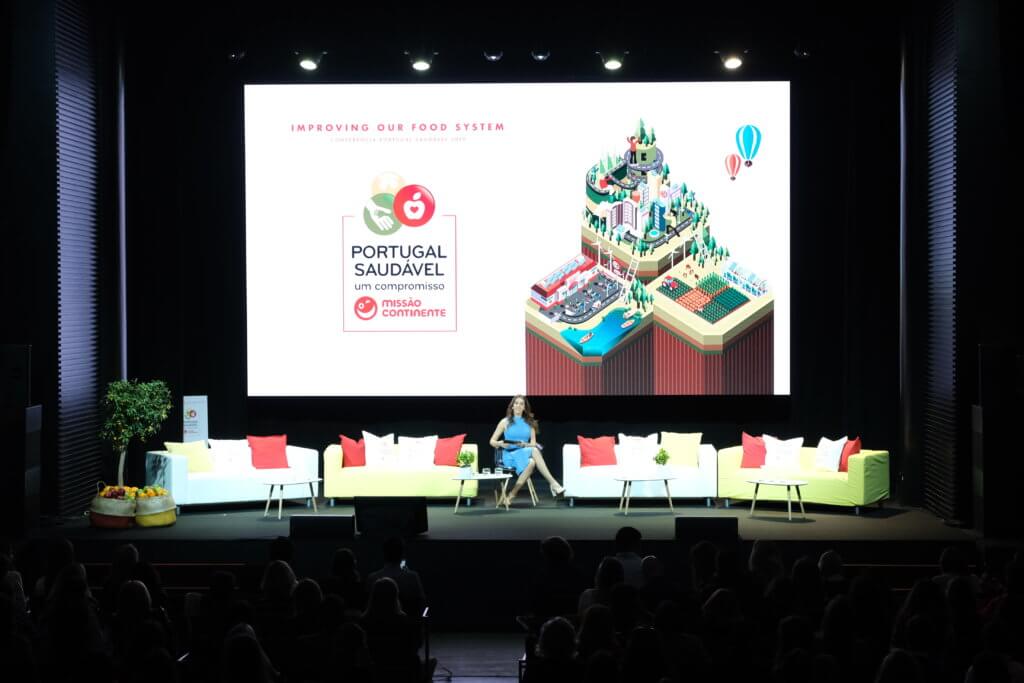Portugal Saudável Conference joined debated the future of food
Cooperating to create a healthier and more sustainable society. Is the pivotal conclusion of Portugal Saudável Conference’s 4th edition, an initiative promoted by Missão Continente, that gathered numerous relevant figures of the academia, politics, health, retail and communication to enrich the public debate on sustainable food systems, capable of reconciling health, environment and economy.
Opening the Conference, Deputy to the Secretary of State of Health, Guilherme Duarte, made a point of highlighting some of the Ministry of Health’s initiatives for the promotion of healthy eating such as the Integrated Strategy for the Promotion of Healthy Eating (involving seven ministries) and the National Program for the Promotion of Healthy Eating.
The two projects comply with the European principle of “Health in all Policies” that, in Guilherme Duarte’s perspective means “an intersectoral approach for the formulation of joined paths, in which decision-makers and partners take into consideration, systematically, all implication in health, seeking synergies, but also seeking to avoid negative impacts in it.”
Succeeding, Corinna Hawkes, Director of Centre for Food Policy of London University, drew attention to the possibility of co-benefits for all agents involved in food systems. In Hawkes’ perspective, such goals can only be reached not only through the collaboration between governments and the industry, but also by adopting an incentives-based legal framework.
Presenting the results of the report commissioned by the European Union Council, Corinna Hawkes mentioned the importance of public procurement, Common Agricultural Policy, of fruits and vegetables distribution circuits in schools, restricted dimension distribution networks and developing the capacity of the different participating agents in the food system.
Ruth Osborne, founder of Retired Hen and mentor of zero-waste restaurant ReTaste, in Stockholm, was also present to explain how to go against the food waste tendency in restaurants, by creating menus based on food surplus collected from supermarkets.

The debate was also enriched with the “À Roda da Alimentação” talks, moderated by Catarina Furtado. On stage, guests of distinct sectors as production, retail, nutrition health, catering and communication, spoke about how attitudes and behaviors in each moment of the value chain affect and are affected by all remaining agents.
The event was closed by the Secretary of State of Consumer Protection. João Torres defended that “The promotion of healthy eating contributes to a smart economic growth, more sustainable and more inclusive”, being possible to stimulate said growth “through the availability of digital tools to farmers, the use of methods and processes that aim for environmental sustainability, biodiversity preservation and reduction of waste, propelling the potential of circular economy and bio economy.”
Tiago Simões, Sonae MC’s Marketing Director, revealed its satisfaction with the conference results, emphasizing the “critical importance of this event to the accomplishment of Missão Continente’s social role”. Tiago Simões referred that “Continente intervenes in all parts of the value chain, having, for that reason, a determinant influence in shaping a food system that is healthier and more sustainable”.
With nearly 400 participants in the audience, the 4th edition of Portugal Saudável Conference was another investment of Continente in the creation and share of knowledge and sensitization to conscious attitudes that allow to, altogether, create a healthier and sustainable food system.
Opening the Conference, Deputy to the Secretary of State of Health, Guilherme Duarte, made a point of highlighting some of the Ministry of Health’s initiatives for the promotion of healthy eating such as the Integrated Strategy for the Promotion of Healthy Eating (involving seven ministries) and the National Program for the Promotion of Healthy Eating.
The two projects comply with the European principle of “Health in all Policies” that, in Guilherme Duarte’s perspective means “an intersectoral approach for the formulation of joined paths, in which decision-makers and partners take into consideration, systematically, all implication in health, seeking synergies, but also seeking to avoid negative impacts in it.”
Succeeding, Corinna Hawkes, Director of Centre for Food Policy of London University, drew attention to the possibility of co-benefits for all agents involved in food systems. In Hawkes’ perspective, such goals can only be reached not only through the collaboration between governments and the industry, but also by adopting an incentives-based legal framework.
Presenting the results of the report commissioned by the European Union Council, Corinna Hawkes mentioned the importance of public procurement, Common Agricultural Policy, of fruits and vegetables distribution circuits in schools, restricted dimension distribution networks and developing the capacity of the different participating agents in the food system.
Ruth Osborne, founder of Retired Hen and mentor of zero-waste restaurant ReTaste, in Stockholm, was also present to explain how to go against the food waste tendency in restaurants, by creating menus based on food surplus collected from supermarkets.

The debate was also enriched with the “À Roda da Alimentação” talks, moderated by Catarina Furtado. On stage, guests of distinct sectors as production, retail, nutrition health, catering and communication, spoke about how attitudes and behaviors in each moment of the value chain affect and are affected by all remaining agents.
The event was closed by the Secretary of State of Consumer Protection. João Torres defended that “The promotion of healthy eating contributes to a smart economic growth, more sustainable and more inclusive”, being possible to stimulate said growth “through the availability of digital tools to farmers, the use of methods and processes that aim for environmental sustainability, biodiversity preservation and reduction of waste, propelling the potential of circular economy and bio economy.”
Tiago Simões, Sonae MC’s Marketing Director, revealed its satisfaction with the conference results, emphasizing the “critical importance of this event to the accomplishment of Missão Continente’s social role”. Tiago Simões referred that “Continente intervenes in all parts of the value chain, having, for that reason, a determinant influence in shaping a food system that is healthier and more sustainable”.
With nearly 400 participants in the audience, the 4th edition of Portugal Saudável Conference was another investment of Continente in the creation and share of knowledge and sensitization to conscious attitudes that allow to, altogether, create a healthier and sustainable food system.
